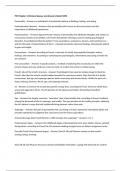PSY Chapter 14 Review Queasy and Answers Rated 100%
Personality: - Answers an individual's characteristic pattern of thinking, feeling, and acting.
Psychodynamic theories: - Answers view personality with a focus on the unconscious and the
importance of childhood experiences.
Psychoanalysis: - Answers Sigmund Freud's theory of personality that attributes thoughts and actions to
unconscious motives and conflicts. (2) Freud's therapeutic technique used in treating psychological
disorders. Freud believed that the patient's free associations, resistances, dreams, and transferences—
and the therapist's interpretations of them—released previously repressed feelings, allowing the patient
to gain self-insight.
Unconscious: - Answers according to Freud, a reservoir of mostly unacceptable thoughts, wishes,
feelings, and memories. According to contemporary psychologists, information processing of which we
are unaware.
Free association: - Answers in psychoanalysis, a method of exploring the unconscious in which the
person relaxes and says whatever comes to mind, no matter how trivial or embarrassing.
Freud's idea of the mind's structure - Answers Psychologists have used an iceberg image to illustrate
Freud's idea that the mind is mostly hidden beneath the conscious surface. Note that the id is totally
unconscious, but ego and superego operate both consciously and unconsciously. Unlike the parts of a
frozen iceberg, however, the id, ego, and superego interact.
Id: - Answers a reservoir of unconscious psychic energy that, according to Freud, strives to satisfy basic
sexual and aggressive drives. The id operates on the pleasure principle, demanding immediate
gratification.
Ego: - Answers the largely conscious, "executive" part of personality that, according to Freud, mediates
among the demands of the id, superego, and reality. The ego operates on the reality principle, satisfying
the id's desires in ways that will realistically bring pleasure rather than pain.
Superego: - Answers the part of personality that, according to Freud, represents internalized ideals and
provides standards for judgment (the conscience) and for future aspirations.
Around what age does Freud theorize a child emerges into superego? - Answers 4 or 5
Psychosexual stages: - Answers the childhood stages of development (oral, anal, phallic, latency, genital)
during which, according to Freud, the id's pleasure-seeking energies focus on distinct erogenous zones.
Describe Freud's Psychosexual stages: - Answers Oral (0-18 mo) Pleasure centers on the mouth--
sucking, biting, chewing
Anal (18-36 mo) Pleasure focuses on bowel and bladder elimination; coping with demands for control
,Phallic (3-6 years) Pleasure zone is the genitals; coping with incestuous sexual feelings
Latency (6 to puberty) A phase of dormant sexual feelings
Genital (puberty on) Maturation of sexual interests
Oedipus [ED-uh-puss] complex: - Answers according to Freud, a boy's sexual desires toward his mother
and feelings of jealousy and hatred for the rival father.
During Phallic stage
Identification: - Answers the process by which, according to Freud, children incorporate their parents'
values into their developing superegos.
Fixation: - Answers according to Freud, a lingering focus of pleasure-seeking energies at an earlier
psychosexual stage, in which conflicts were unresolved.
Defense mechanisms: - Answers in psychoanalytic theory, the ego's protective methods of reducing
anxiety by unconsciously distorting reality.
Repression: - Answers in psychoanalytic theory, the basic defense mechanism that banishes from
consciousness anxiety-arousing thoughts, feelings, and memories.
6 defense mechanisms:
Freud believed that repression, the basic mechanism that banishes anxiety-arousing impulses, enables
other defense mechanisms, six of which are listed here. - Answers Unconscious process employed to
avoid anxiety-arousing thoughts or feelings:
regression
-retreating to a more infantile psychosexual stage, where some psychic energy remains fixated
-ex: a little boy reverts to the oral comfort of thumb sucking in the car on the way to his first day of
school
, reaction formation
-switching unacceptable impulses into their opposites
-ex: repressing angry feelings, a person displays exaggerated friendliness
projection
-disguising one's own threatening impulses by attributing them to others
-ex: "the thief thinks everyone else is a thief"
rationalization
-offering self-justifying explanations in place of the real, more threatening unconscious reasons for one's
actions
-ex: a habitual drinker says she drinks with her friends "just to be sociable"
displacement
-shifting sexual or aggressive impulses toward a more acceptable or less threatening object or person
-ex: a little girl kicks the family dog after her mother sends her to her room
denial
-refusing to believe or even perceive painful realities
-ex: a partner denies evidence of his loved one's affair




